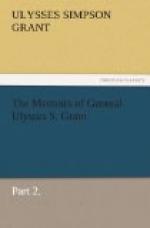Those early days in California brought out character. It was a long way off then, and the journey was expensive. The fortunate could go by Cape Horn or by the Isthmus of Panama; but the mass of pioneers crossed the plains with their ox-teams. This took an entire summer. They were very lucky when they got through with a yoke of worn-out cattle. All other means were exhausted in procuring the outfit on the Missouri River. The immigrant, on arriving, found himself a stranger, in a strange land, far from friends. Time pressed, for the little means that could be realized from the sale of what was left of the outfit would not support a man long at California prices. Many became discouraged. Others would take off their coats and look for a job, no matter what it might be. These succeeded as a rule. There were many young men who had studied professions before they went to California, and who had never done a day’s manual labor in their lives, who took in the situation at once and went to work to make a start at anything they could get to do. Some supplied carpenters and masons with material—carrying plank, brick, or mortar, as the case might be; others drove stages, drays, or baggage wagons, until they could do better. More became discouraged early and spent their time looking up people who would “treat,” or lounging about restaurants and gambling houses where free lunches were furnished daily. They were welcomed at these places because they often brought in miners who proved good customers.
My regiment spent a few weeks at Benicia barracks, and then was ordered to Fort Vancouver, on the Columbia River, then in Oregon Territory. During the winter of 1852-3 the territory was divided, all north of the Columbia River being taken from Oregon to make Washington Territory.
Prices for all kinds of supplies were so high on the Pacific coast from 1849 until at least 1853—that it would have been impossible for officers of the army to exist upon their pay, if it had not been that authority was given them to purchase from the commissary such supplies as he kept, at New Orleans wholesale prices. A cook could not be hired for the pay of a captain. The cook could do better. At Benicia, in 1852, flour was 25 cents per pound; potatoes were 16 cents; beets, turnips and cabbage, 6 cents; onions, 37 1/2 cents; meat and other articles




